Lundi 1 janvier 1968 : Birgit Nilsson (Suède). Film de Eric Nilsson. A documentary following Madame Nilsson on her Tours to New York, New-Haven, Lexington, Chicago, Vienna, ending in Stockholm. Lots of footage, backstage rehearsals, contact with fans and managers and fellow musicians.
Mardi 2 janvier 1968 : Tristan und Isolde. Opéra royal de Stockholm. Bendix. Hoiseth. Rundgren. Birgit Nilsson (Isolde). Bjorling. Brilioth. Ericson.
Vendredi 5 janvier 1968 : Tosca. Opéra royal de Stockholm. Bendix. Birgit Nilsson (Floria Tosca). Ulfung. Saeden.i
Lundi 8 janvier 1968 : Tristan und Isolde. Staatsoper Vienne. Hollreiser. Thomas. Kreppel. Birgit Nilsson (Isolde). Wiener. Bunger. Hesse.
Jeudi 11 janvier 1968 : Elektra. Staatsoper Vienne. Hollreiser. Mödl. Birgit Nilsson (Elektra). Lindholm. Beirer. Nienstedt.
Mardi 30 janvier 1968 ; Birgit Nilsson enregistre la “mort d’Isolde” de Tristan und Isolde sous la direction de Georg Solti. L’enregistrement est publié avec la troisième symphonie de Beethoven (1963) et le voyage de Siegfried sur le Rhin. ENREGISTREMENT STUDIO.
Lundi 12 février 1968 : Elektra. Metropolitan opéra de New York. Schippers. Birgit Nilsson (Elektra). Rysanek. Resnik. Dooley. Nagy.
Vendredi 16 février 1968 : Elektra. Metropolitan opéra de New York. Schippers. Birgit Nilsson (Elektra). Rysanek. Resnik. Dooley. Nagy.
Mardi 20 février 1968 : Elektra. Metropolitan opéra de New York. Schippers. Birgit Nilsson (Elektra). Delcampo. Madeira. Dooley. Parly.
Review of Irving Kolodin in the Saturday Review
In conjunction with Birgit Nilsson's last Elektra of the season - which was, perhaps, the best sung of any she has ever offered here - there was occasion for re-acquaintance with the Klytämnestra of Jean Madeira. She has, in the lapse of seven years since last performing the part here, intensified its horror content by an infusion of psychopathic degeneracy almost endearing in its loathsomeness. As for vocal production, when she enunciated her first words - "Was willst Du? Seht doch, dort!" - one had the impression that, maybe, after all, the new Met did incorporate an amplifying system. Such a fantasy was of no service to Ina Delcampo, a soprano associated with a background in Vienna, who made her debut as Chrysothemis. Her action suggested a long, hard look at the characterization of Leonie Rysanek, but it was blurred, foggy, and unfocused in vocal production - a set of strong disabilities vis-a-vis Strauss's scoring.
24 février 1968 : Die Walkure. Metropolitan Opera de New York. Klobucar. Birgit Nilsson (Brunnhilde). Vickers. Rysanek. Stewart. Ludwig. Ridderbusch. ENREGISTREMENT LIVE.
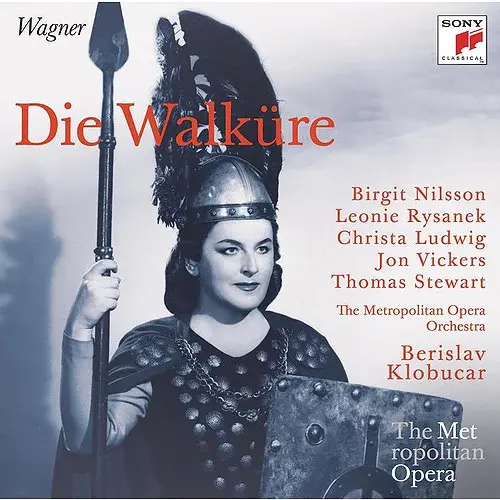
Lundi 4 mars 1968 : Die Walkure. Metropolitan Opera de New York. Klobucar. Birgit Nilsson (Brunnhilde). Vickers. Janowitz. Stewart. Ludwig. Ridderbusch.
Lundi 11 mars 1968 : TRISTAN UND ISOLDE - BBC RADIO 3. Love Duet from Act 2 of Wagner's opera, sung by BIRGIT NILSSON and FRITZ UHL with the VIENNA PHILHARMONIC ORCHESTRA Conducted by GEORG SoLTi
Samedi 23 mars 1968 : Turandot. Opéra de Paris, Palais Garnier. Prêtre. Birgit Nilsson (Turandot). Guiot. King. Mars. Benoît. Corazza. Mallabrera. Loreau. Soyer. Photos de Roger Pic.
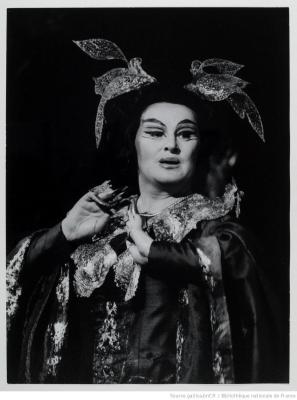
Mercredi 27 mars 1968 : Turandot. Opéra de Paris, Palais Garnier. Prêtre. Birgit Nilsson (Turandot). Guiot. King. Mars. Benoît. Corazza. Mallabrera. Loreau. Soyer.
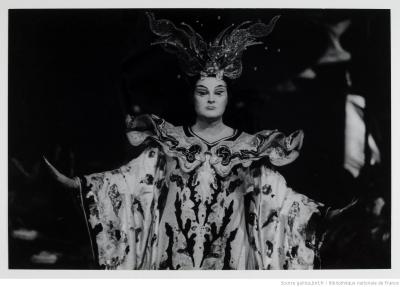
Vendredi 29 mars 1968 : Turandot. Opéra de Paris, Palais Garnier. Prêtre. Birgit Nilsson (Turandot). Guiot. King. Mars. Benoît. Corazza. Mallabrera. Loreau. Soyer.
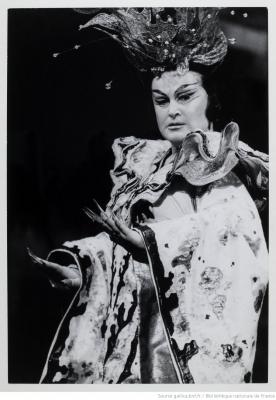
Samedi 27 avril 1968 : INTERNATIONAL CONCERT HALL / BBC RADIO 4. Rome. Records including music by Rossini, Marcello, Respighi, Vivaldi. and Mendelssohn; and the Triumph Scene from Verdi's Aida. VIRTUOSI bi ROMA. ROME POLYPHONIC CHOIR I Musici
BIRGIT NILSSON , FRANCO CORELLI GRACE BUMBRY CHORUS AND ORCHESTRA OF THE ROME OPERA HOUSE Conducted by ZUBIN MEHTA
Samedi 8 juin 1968 : Gotterdammerung. Staatsoper Vienne. Stein. Beirer. Birgit Nilsson (Brunnhilde). Janowitz. Kreppel. Hotter. Neidlinger. Hesse. ENREGISTREMENT LIVE.
Dimanche 23 au dimanche 30 juin 1968 : Der Freischutz. Munich, Burgerbrau. Heger. Gedda. Birgit Nilsson (Agathe). Berry. Anheisser. Weller. Forster. Crass. Koth. ENREGISTREMENT STUDIO.
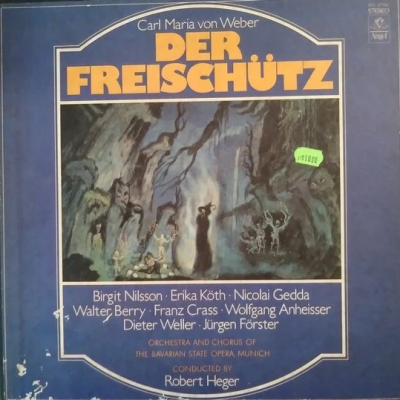
Dimanche 28 juillet 1968 : Tristan und Isolde. Festival de Bayreuth. Bohm. Windgassen. Birgit Nilsson (Isolde). Hoffman. Feldhoff. Talvela. Bunger. ENREGISTREMENT LIVE.
Lundi 12 août 1968 : AUS BURG UND OPER. Heinz Fischer-Karwin : Gespraech mît Birgit Nilsson ueber ihre Werdegang.
Vendredi 23 août 1968 : Tristan und Isolde. Festival de Bayreuth. Klobucar. Windgassen. Birgit Nilsson (Isolde). Hoffman. Feldhoff. Talvela. Bunger.
Mardi 17 septembre 1968 : Turandot. Metropolitan opéra de New York. Mehta. Birgit Nilsson (Turandot). Konya. Tucci. Michalski. Caruso.
Vendredi 20 septembre 1968 : Turandot. Metropolitan opéra de New York. Mehta. Birgit Nilsson (Turandot). Konya. Tucci. Michalski. Caruso. ENREGISTREMENT LIVE.
Samedi 28 septembre 1968 : Turandot. Metropolitan opéra de New York. Mehta. Birgit Nilsson (Turandot). Konya. Tucci. Michalski. Caruso.
Vendredi 4 octobre 1968 : Tosca. Metropolitan Opera de New York. Molinari-Pradelli. Birgit Nilsson (Floria Tosca). Corelli. Bacquier.
Review of Winthrop Sargeant in The New Yorker
The Metropolitan Opera's new production of "Tosca," which was unveiled last Friday night, has its good and its bad points. The presence in the cast of Birgit Nilsson and Franco Corelli will unquestionably make it a best-seller - partly, I think because these are the two loudest singers to be heard today.
The new sets and costumes, by Rudolf Heinrich, unlike his sets for "Salome" and "Elektra," are agreeably realistic. Aside from a Mary Magdalene in a hoop skirt who appears in the painting Cavaradossi is creating in the first act (and don't argue with me that Cavaradossi is a nineteenth-century figure; nobody else in the fresco he was painting wore anything but Biblical clothing), I found the scenery entirely effective, if a little heavy.
As for the new Viennese director, Otto Schenk, who had devised the action, I was considerably disappointed in him. "Tosca" is a terrifying enough opera without having every point of terror exaggerated to an extent that would make it clear to a six-year old. I have never seen a production in which so much rolling on the floor and free-style wrestling occurred. The visual pun of making Scarpia look like Napoleon is not really very clever or elucidating. And it is, I think, a great mistake to spoil the end of the second act by making Tosca light the candles she places beside Scarpia's body. It introduces an air of deliberation in Tosca's part that is not consistent with her character. The candles should be an afterthought, stimulated by the sight of candles already lit.
There were also a good many episodes that I am sure Mr. Schenk was not responsible for. The corpse of Cavaradossi wagged its head and lifted an arm in the last act, and in the middle of the second act Gabriel Bacquier - good actor that he is - became so immersed in his role as Scarpia that he clearly enunciated the words, "Get up!" in English to Miss Nilsson when Spoletta knocked at the door, just as if he were caught in an embarrassing clinch in real life.
Miss Nilsson was costumed in a very feminine way and made a handsome heroine. She also sang superbly and, within the framework of Mr. Schenk's staging, acted with a great deal of conviction. Her "Vissi d'arte" was sung, as has been fashionable now and then since the time of Jeritza, as she lay on her stomach. Mr. Corelli acted when it did not interfere with the display of his voice. His "Vittoria, vittoria!" was delivered with the power appropriate to a wounded bull and was protracted beyond all rules of good taste, just to show how long his lung power could hold out. He also took all the meditative atmosphere out of "E lucevan le stelle," tearing it to shreds and bellowing a good part of it. However, it is only fair to note that his audience shouted and pounded its approval of this vocal weight-lifting.
Mr. Bacquier is an intelligent Scarpia if not the loudest one in the world, and he did what he could with what Mr. Schenk gave him. Fernando Corena was, as always, an outstanding Sacristan. The lesser roles were well done, and Francesco Molinari-Pradelli conducted a knowing performance.
Mercredi 9 octobre 1968 : Turandot. Metropolitan opéra de New York. Mehta. Birgit Nilsson (Turandot). McCracken. Stojanovic. Giaiotti. Caruso.
Samedi 12 octobre 1968 : Tosca. Metropolitan Opera de New York. Molinari-Pradelli. Birgit Nilsson (Floria Tosca). Corelli. Bacquier.
Mardi 15 octobre 1968 : Tosca. Metropolitan Opera de New York. Molinari-Pradelli. Birgit Nilsson (Floria Tosca). Corelli. Bacquier.
Vendredi 18 octobre 1968 : Tosca. Metropolitan Opera de New York. Molinari-Pradelli. Birgit Nilsson (Floria Tosca). Corelli. Bacquier.
Lundi 21 octobre 1968 : Tosca. Metropolitan Opera de New York. Molinari-Pradelli. Birgit Nilsson (Floria Tosca). Corelli. Bacquier.
Jeudi 24 octobre 1968 : Tosca. Metropolitan Opera de New York. Molinari-Pradelli. Birgit Nilsson (Floria Tosca). Corelli. Bacquier. (
Jeudi 31 octobre 1968 : Die Walkure. Metropolitan Opera de New York. Karajan. Birgit Nilsson (Brunnhilde). Vickers. Crespin. Stewart. Ludwig. Talvela.
Mardi 5 novembre 1968 : Die Walkure. Metropolitan Opera de New York. Karajan. Birgit Nilsson (Brunnhilde). King. Crespin. Stewart. Ludwig. Talvela.
Samedi 9 novembre 1968 : Tosca. Metropolitan Opera de New York. Molinari-Pradelli. Birgit Nilsson (Floria Tosca). Corelli. Raimondi.
Jeudi 14 novembre 1968 ; The University musical society of the university of Michigan presents Birgit Nilsson, soptano, John Wustman at the piano. Hill auditorium, Ann Arbor, Michigan. Programme : Dich teure Halle, Träume, Schmerzen (Wagner), Gretchen am Spinnrade, Auflösung, Die junge Nonne (Schubert), Befreit, Wiegenlied, Zueignung (Richard Strauss), Höstkväll, ver det en dröm (Sibelius), Morgonsang, gieb mir dein Herze (Melartin), det förste Möde, en svane, en dröm Grieg), ebben, ne andro lontana (Catalani - La Wally)
Mercredi 20 novembre 1968 : THE VIENNA STATE OPERA / BBC RADIO 4 : A portrait in words and music by Nigel Douglas with the voices of MARIA CALLAS MARIO DEL MONACO, LISA DELLA Casa GIUSEPPE DI STEFANO NIGEL DOUGLAS. Tito GOBBI ADÈLE LEIGH, CHRISTA LUDWIG ANNA MOFFO , BIRGIT NILSSON ALFRED PICCAVER , PAUL SCHOEFFLER ELISABETH SCHWARZKOPF Leo SLEZAK , RICHARD TAUBER
JON VICKERS , EBERHARD WACHTER LJUBA WELITSCH WOLFGANG WINDGASSEN Nigel Douglas , who started his professional career in Vienna, is now . principal tenor with the Zurich Opera. Produced by GEORGE FISCHER
Dimanche 24 novembre 1968 : Tristan und Isolde. Staatsoper Vienne. Bohm. Thomas. Frick. Birgit Nilsson (Isolde). Wiener. Bunger. Hesse.
Jeudi 28 novembre 1968 : Elektra. Staatsoper Vienne. Bohm. Mödl. Birgit Nilsson (Elektra). Rysanek. Beirer. Nienstedt.
Dimanche 1 décembre 1968 : Turandot. Staatsoper Vienne. Klobucar. Birgit Nilsson (Turandot). Equiluz. Guthrie. McCracken. Lotte Rysanek.
Mercredi 4 décembre 1968 : Tosca. Staatsoper Vienne. Klobucar. Birgit Nilsson (Floria Tosca). Spiess. Hotter.
Samedi 7 décembre 1968 : Tosca. Opéra royal de Stockholm. Bendix. Birgit Nilsson (Floria Tosca). Ulfung. Saeden.
Samedi 14 au vendredi 20 décembre 1968 : Première session de l'enregistrement de TANNHAUSER réalisé à Berlin, Jesus-Christus-Kirche : Gerdes, Adam, Windgassen, Fischer-Dieskau, Laubenthal, Hirte, Lenz, Sotin, Birgit Nilsson (Vénus / Elisabeth), Alda. ENREGISTREMENT STUDIO. La sconde session se déroule du 20 au 22 février 1969 et la troisième les 5 et 6 mai 1969.
Dimanche 29 décembre 1968 : Die Walkure. Opéra royal de Stockholm. Bendix. Brilioth. Rundgren. Bjorling. Af Malmborg. Birgit Nilsson (Brunnhilde). Ericson.
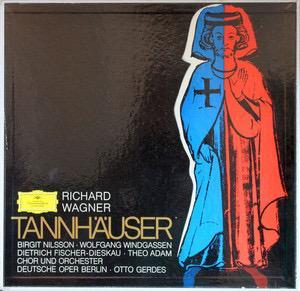
Mise à jour : Pierre Marchais 20251016